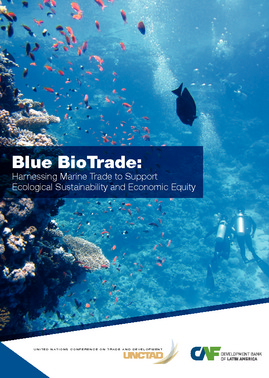| dc.contributor.author | Bifani, Paolo | |
| dc.contributor.author | Agardy, Tundi | |
| dc.contributor.author | Vivas Eugui, David | |
| dc.contributor.author | Jaramillo, Lorena | |
| dc.contributor.author | Gómez- García, René | |
| dc.contributor.author | Vignati, Federico | |
| dc.coverage.spatial | América Latina y el Caribe | es_ES |
| dc.date.accessioned | 2019-04-03T15:47:59Z | |
| dc.date.available | 2019-04-03T15:47:59Z | |
| dc.date.issued | 2019-04-03 | |
| dc.identifier.citation | Bifani, P., Agardy, T., Vivas Eugui, D., Jaramillo, L., Gómez- García, R., & Vignati, F. (2019). Blue BioTrade: Harnessing Marine Trade to Support Ecological Sustainability and Economic Equity. Caracas: CAF y UNCTAC. Retrieved from https://scioteca.caf.com/handle/123456789/1415 | en |
| dc.identifier.uri | https://scioteca.caf.com/handle/123456789/1415 | |
| dc.description.tableofcontents | The following report describes how the application of the Blue BioTrade concept can promote sustainable
and equitable economic sectors and value chains that rely on marine and coastal resources. A proposal
for implementing a Blue BioTrade approach is described in Annex I. Blue BioTrade principles and criteria
can be applied without the force of law through voluntary verification and certification systems that enable
firms to obtain a price premium for embracing equity and sustainability. Once an international consensus on the principles and criteria for Blue BioTrade has been established, and certification systems are in
place (e.g. under the existing framework of the Union for Ethical BioTrade), firms will be able to publicly
demonstrate their commitment to sustainability and equity. This represents the first exchange in an
ongoing dialogue on Blue BioTrade between UNCTAD, CAF –development bank of Latin America-, and
their regional and national partners throughout the world.
Expanding Blue BioTrade will require clear guidelines expressly tailored to the marine and coastal
environment, as both the governance arrangements and ecological characteristics of oceans very different
from land-based economic sectors. Four industries should be regarded as priorities for Blue BioTrade:
(i) fisheries and aquaculture; (ii) marine-based pharmaceuticals and cosmetics; (iii) marine and coastal
tourism, and (iv) carbon capture and sequestration. Leveraging Blue BioTrade principles can enhance
both the economic value of natural capital, which supports food production, tourism, and a range of other
economic activities, as well as the noneconomic benefits of ecosystem services, including water-quality
maintenance, carbon sequestration, shoreline stabilization and disaster mitigation, scenic beauty, and the
cultural worth of traditional livelihoods. Blue BioTrade focuses on the interconnected values and benefits
of ecologically healthy, well-managed marine and coastal habitats to achieve sustainability and enhance
economic efficiency. | es_ES |
| dc.language.iso | en | es_ES |
| dc.publisher | CAF y UNCTAC | es_ES |
| dc.subject | Ambiente | es_ES |
| dc.subject | Cambio climático | es_ES |
| dc.subject | Desarrollo | es_ES |
| dc.subject | Desastres naturales | es_ES |
| dc.subject | Economía | es_ES |
| dc.subject | Recursos naturales | es_ES |
| dc.title | Blue BioTrade: Harnessing Marine Trade to Support Ecological Sustainability and Economic Equity | es_ES |
| dc.type | Book | es_ES |
| dc.publisher.city | Caracas | es_ES |
| caf.relation.languageVersion | 123456789/1471 | |





